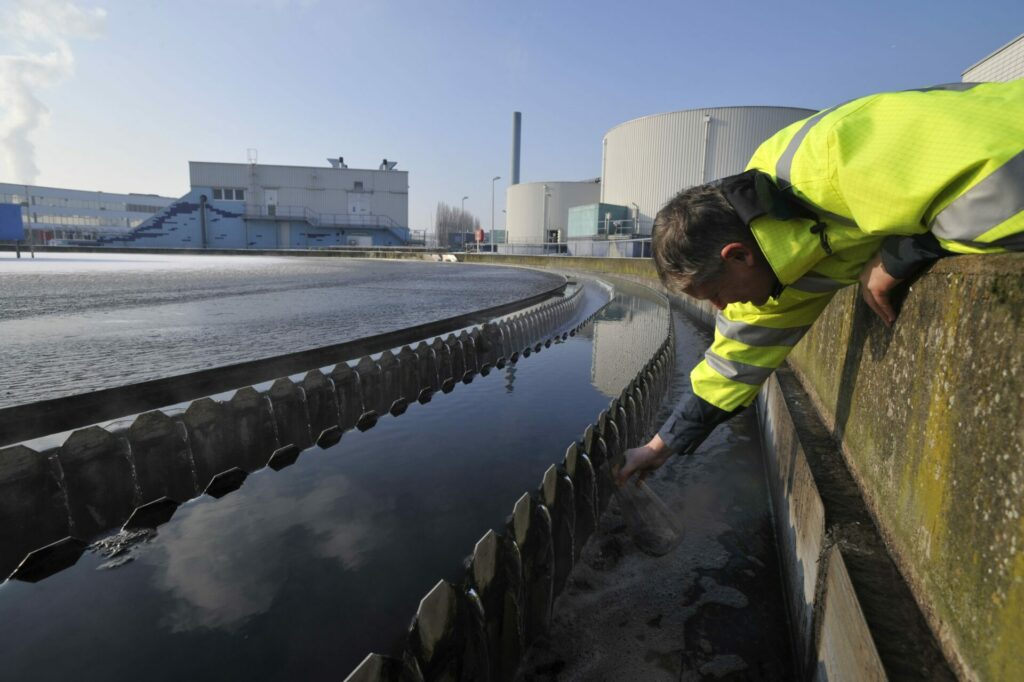A political scandal has unfolded in recent days as problems with drinking water distributed by the Brussels water company Vivaqua were kept quiet.
Drinking water in the Flemish town of Halle, which is supplied by Brussels' Vivaqua from a Walloon basin, had PFAS levels above the permitted threshold in the region, the Flemish Watergroup confirmed at the start of this month.
It has since been reported that Flemish Environment Minister Zuhal Demir warned her Walloon and Brussels colleagues about this at the beginning of the year.
Per- and polyfluoroalkyl substances (PFAS) are man-made pollutants known as "forever chemicals" because they don’t break down in the environment. In the past, pollution of PFAS mainly occurred in Flanders as a result of the pollution at American multinational 3M's site in the Zwijndrecht, which was at the centre of a pollution scandal in recent years.
However, the issue has now also been put at the centre of political debate in Brussels and Wallonia, as the letter from Demir implies that Walloon Environment Minister Céline Tellier, but also Brussels Environment Minister Alain Maron and Health Minister Elke Van den Brandt were aware of the situation.
Impact on Brussels water
Regarding the pollution in Halle, De Watergroep stressed that the elevated PFAS concentrations observed were no cause for concern. "These concentrations are around 70-80 ng/l, while the future drinking water standard coming into force from 12 January 2026 is 100ng/l. The intake of PFAS through drinking water is very limited compared to intake through other channels (food, air and soil)."
Still, these reports have resulted in many questions being raised about how safe the drinking water in the region is.
Maron stressed on X, formerly Twitter, that "the people of Brussels can be reassured about the quality of their water", while Alain De Lombaerts, Vivaqua's Production Director, told BX1 that the PFAS levels recorded in the water here are "well below the threshold".
Maron's spokesperson Simon Vandamme, meanwhile, told The Brussels Times that Maron had "no jurisdiction over pollution at Halle since Vivaqua is an inter-municipal company and the Flemish Region is responsible for monitoring the quality of drinking water on its territory".
However, Vandamme added that, as soon as Maron was informed, at the end of January, contact was made with Vivaqua. "The Minister was quickly assured (on 2 February) that everything was in order in Brussels and that the Halle problem was being dealt with in consultation with De Watergroep and the Flemish administrations concerned."
The problem may have been solved, but opposition parties MR and CD&V still called on Maron to discuss the situation in the regional parliament's Environment Committee next Wednesday during a topical debate on the issue of PFAS pollution.
The leader of the MR group in the Brussels Regional Parliament, David Leisterh, and the liberal MP Aurélie Czekalski, argued that, even if the minister wants to provide reassurance, he must come and answer to the regional representatives as soon as possible. "The urgency of the situation means that we must not create panic. We will not accept any danger to our fellow citizens," they noted in a press release.
CD&V MP Bianca Debaets argued that the fact Maron is "making light of it by stating that he is not competent" is not acceptable.
"He had known about this for some time and then did nothing at all to resolve the situation. We too will therefore ask for the necessary clarification in the Environment Committee, because it is simply unacceptable for Brussels residents to be faced with such a health risk."
Issues in Wallonia
In Wallonia, Tellier stressed that she had replied several times to Demir's letters, stating that the region was open to consultation and cooperation. She also added that the Walloon government is working on a decision to define the new standards and modalities for monitoring water extraction zones, but that discussions are still ongoing.
The issue of PFAS also caused another stir in Walloon politics as an RTBF broadcast on Wednesday last week showed that, between October 2021 and March 2023, residents of 12 villages in the southwest of the region consumed water contaminated with levels of the chemical that exceeded the tolerable dose set by the European Food Safety Authority, and that here too, the Walloon water company SWDE and the administration knew about it.
Tellier is also expected to provide further explanations on this case during the Walloon Environment Committee meeting on Tuesday. She also faces criticism regarding the lack of transparency and the lack of communication, as the population was not informed.
Vivaqua did not respond to requests for comment.

